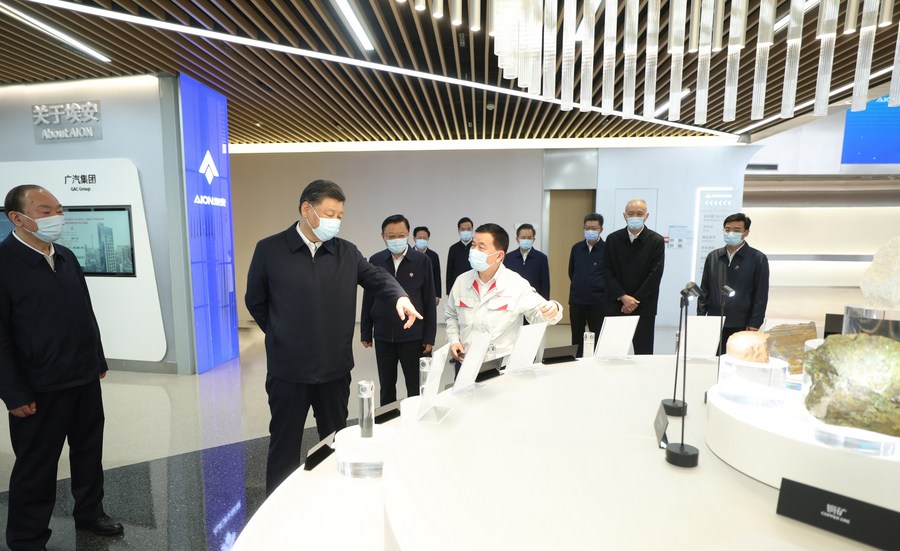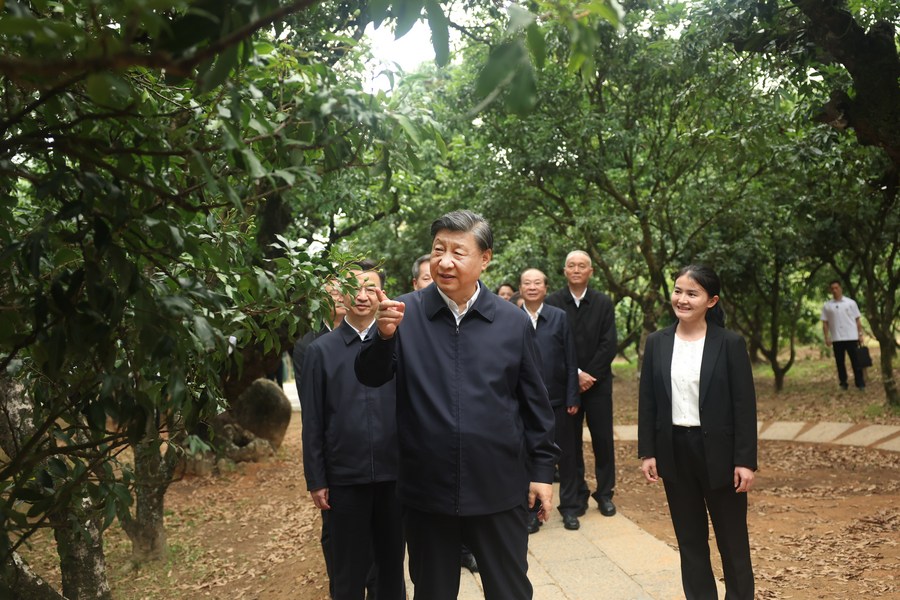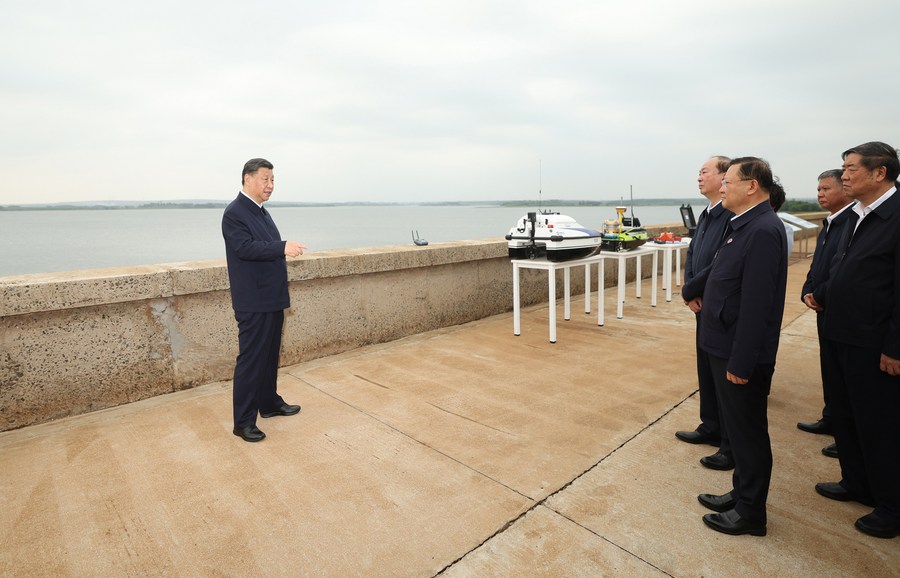
Chinese President Xi Jinping, also general secretary of the Communist Party of China Central Committee and chairman of the Central Military Commission, visits GAC Aion New Energy Automobile Co., Ltd. in Guangzhou, south China's Guangdong Province, April 12, 2023. (Xinhua/Ju Peng)
BEIJING, April 15 -- President Xi Jinping this week conducted a four-day inspection trip to south China's Guangdong Province, long considered a pacemaker of the country's reform and opening up that began in the late 1970s.
This time, Xi, also general secretary of the Communist Party of China Central Committee and chairman of the Central Military Commission, set a new target for the province -- to be a trailblazer on the Chinese path to modernization.
The trip took him to the cities of Zhanjiang, Maoming and Guangzhou, where he visited companies that manufacture screens and new energy cars, a port, and a lychee-growing village, among other sites.
The trip followed the launch of a Party-wide campaign to conduct in-depth research and study, asking Party cadres, in particular, to go out of their offices to better understand the situations on the ground -- the prominent problems and how to solve them.
As the Party's top official, Xi has set an example of conducting such fact-finding research. And his inspection in Guangdong revolves around the topic of pursuing Chinese modernization.
He chose the western part of Guangdong as the focus of his research. This part of the province is less developed than the Pearl River Delta, known for the high concentration of manufacturers and hi-tech companies.
During the trip, Xi said that Guangdong's development not only depends on the Pearl River Delta, but also on the joint development of northern, eastern, and western Guangdong.
"Chinese modernization is aimed at promoting common prosperity and addressing the unbalanced development among regions," Xi said.
In China, unbalanced development typically manifests itself in the disparity between urban and rural areas. To Xi, the root cause of unbalanced development between western Guangdong and the Pearl River Delta largely resides in industries.

Chinese President Xi Jinping, also general secretary of the Communist Party of China Central Committee and chairman of the Central Military Commission, visits a lychee orchard at a village in Genzi Township, Gaozhou City of Maoming, south China's Guangdong Province, April 11, 2023. (Xinhua/Ju Peng)
In order to learn about rural industries, Xi visited a lychee orchard in a village in Maoming, checking local efforts to develop the lychee industry into a successful one that has brought both jobs and income to locals.
Talking with technicians on the spot, Xi learned that by growing lychees and selling them and related products, a family could earn an average annual income of 100,000 yuan (about 14,600 U.S. dollars) in a good year.
Hailing the broad prospects of the local lychee industry, Xi emphasized efforts to remain committed to pursuing common prosperity and increase assistance and support for places that are lagging behind financially.
Chinese modernization is essentially different from Western modernization, he said, adding that China will not tread the path of Western modernization -- with features including polarization and plunder -- as such a path leads nowhere.
Xi also learned about the challenges the lychee industry faces, in particular fresh-keeping techniques, and urged local authorities to solve the problems.
Adopting the problem-oriented approach is an essential requirement of the campaign to conduct in-depth research and study, and it was practiced by Xi in his inspection trip to Guangdong.

Chinese President Xi Jinping, also general secretary of the Communist Party of China Central Committee and chairman of the Central Military Commission, visits a water resource allocation project in Zhanjiang City, south China's Guangdong Province, April 10, 2023. (Xinhua/Ju Peng)
With the water shortage in western Guangdong in mind, Xi visited Dashuiqiao Reservoir in Xuwen County in Zhanjiang, a junction station for water diversion, where he learned about the progress of the reservoir construction and the water quality.
Xi said that a sound allocation of water resources will help address unbalanced development among regions, and coordinated development is necessary for achieving common prosperity.
Xi has always stressed the need to ensure security in the pursuit of development and attached great importance to food security.
In his previous inspection tours, he often went to farmlands to check the local farming industry. But this time, he came to a mariculture base on Donghai Island in Zhanjiang, where he called for efforts to utilize both land and sea resources to guarantee food security.
"The general secretary pays great attention to the mariculture and fisheries industry, and is also very familiar with these fields," said Mai Kangsen, dean of the Fisheries College at the Ocean University of China.
"This shows that the general secretary cares a lot about ensuring food supply for over 1.4 billion people in the country," Mai said.
Sci-tech development is another concern of Xi, who has said on many occasions that high-level self-reliance and strength in science and technology are the keys to Chinese modernization.
The final leg of his trip is Guangdong's capital city, Guangzhou, one of the country's sci-tech hubs.
In an inspection of GAC Aion New Energy Automobile Co., Ltd., Xi visited the exhibition hall, assembly workshop, and workshop for producing batteries, and learned about the enterprise's progress made in achieving breakthroughs in core technologies in key fields and what it has been doing in developing higher-end, smarter and greener manufacturing.
At the GAC R&D Center, Xi took an attentive look at the labs for intelligent networking and model design.
"Breakthroughs in core technologies in key fields made by companies are of great concern to the general secretary," said Zeng Qinghong, chairman of GAC Group.
China is a big country and must attach importance to the real economy and take the path of self-reliance. Core technologies in key fields should be based on independent research and development, Xi said.
"Self-reliance in no way means seeking development with our doors closed to the rest of the world. International cooperation is also welcome," Xi said, adding that China's reform and opening up policy will remain unchanged over the long term.
Looking to the future of China's development, Xi is fully confident. "With clear goals, plans and strategies, Chinese modernization will surely be achieved. We will advance the modernization drive with solid steps," he said.











